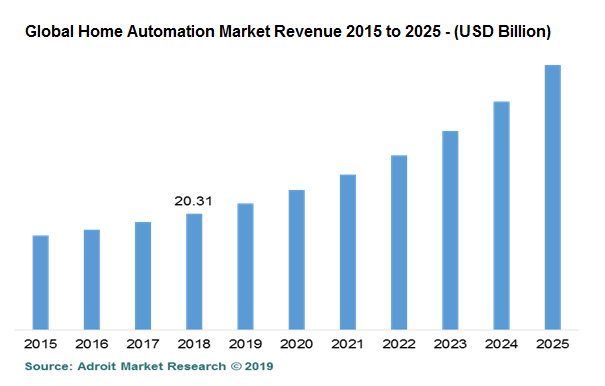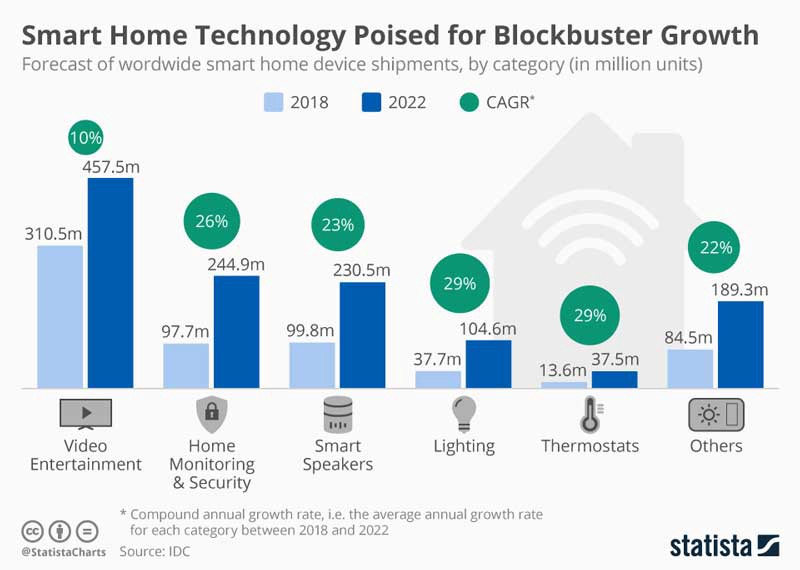

Prashant Pundir
The Present and Future of Home Automation for Kids
You wake up hurriedly at 5:30 A.M. from the sweet murmuring sound of the alarm clock. But wait, the alarm clock went a bit earlier than usual? Did it develop a fault? No, the smart clock does not want you to miss out on that crucial presentation you have to give.
The smart clock studied your schedule, and the alarm went off. Let’s get the day started. You go for a nice, quick shower that turns on automatically and adjusts itself to your preference for slightly warm water. Now you are all set and ready to go.
You go outside, and solar panels have your electric car ready, fully charged. With everything sorting itself out, you go on a smooth ride and rock that presentation. You come back home after a long, tiring day and unwind on the sofa. The music player knows your taste in music and plays all the songs that give you solace to relieve your mood.
Does it all sound like a far-fetched, utopian existence? However, the truth is home automation is a real possibility, and this is how smart homes soon may look like.
The newer generation is the one that would revel and fancy themselves in an advanced environment of home automation trends. Home automation may seem like a thing of leisure right now but in the future, it is going to become as common as owning a TV or a mobile phone.
Not only this but companies that provide home automation would probably become one of the biggest employers. To reap the benefits of this, parents should let their children learn about home automation as it is not only fun but also will open up a lot of opportunities in the future.
We are already in 2021, and it is quite intriguing to look at a Swedish research firm Berg Insight that says around 147 million homes in Europe and North America will be ‘smart’ by 2022. Therefore, it is important to recognize that home automation will become an integral part of our daily lives in the future and there is a great need for our kids to learn and understand the nuances of it.
Now more than ever, there is a large audience that possesses great knowledge about connected technologies. The future holds autonomous homes run by AI, and home automation provides a great potential for children to learn not only the technological advancements but also acquire a skill set that would boost their productivity and professional careers.
The future demands automated attentiveness, and for that, we need to prepare our children today; developments in home automation and robotics will play a huge role in the employment sector and children must be prepared to grab the opportunities that are going to come their way with both hands.
The home automation market was worth US$5.77 billion in 2013, which stands by 2020 at a market value of around US$12.81 billion. At the end of 2019, there were already around 9.5 billion connected IoT devices as per IoT Analytics. IDC states that sustained growth is expected to continue … as consumers adopt multiple devices within their homes, and as the global availability of products and services increases.
Source: Adroit Market Research
What is Home Automation?
Smart homes belong to the all-pervasive computing environment. People also like to call smart homes “aware homes”, “adaptive homes”, “genius homes”, and of course home automation.
One of the earliest definitions of home automation was bestowed by Rudolf: “The smart home concept is the integration of different services within a home by using a common communication system. It assures an economic, secure, and comfortable operation of the home and includes a high degree of intelligent functionality and flexibility.”
In simple terms, home automation is a way to make your life more convenient with the introduction of technology in your home and letting electronic devices reduce human tasks and function automatically. All these devices are connected to the internet, and there is no need to command them via voice assistance or any app.
Internet of Things and Home Automation
The Internet of Things (IoT) consists of technological devices that are connected to the internet, for example, smart bulbs that you can easily turn on and off via an app. Home automation emerged out of IoT, i.e., all the home automation devices that surround us in our daily lives are IoT devices.
Therefore, IoT directly refers to technological devices connected to the internet. Whereas, home automation is all the things that you can do with these devices to make your life convenient and reduce human activities.
Growing Up with Home Automation
“Growing up is never easy. You hold onto things that were. You wonder what’s to come. But that night, I think we knew it was time to let go of what had been and look ahead to what would be. Other days. New days. Days to come.” – The Wonder Years
It is fair to say that the experience of today’s children of the modern age is much different than ours. Technological advancement has ensured a smarter way of living, and children these days learn about home automation and its functionality while growing up.
Technology has also become a natural part of their lives, and therefore, it is easier for them to use devices that help them cater to their lifestyles. Children can easily monitor home lighting systems, control air conditioners, and keep a check on the door lock for security purposes, all with the assistance of apps on their smartphones.
Source: Statista
These experiences help them have a better understanding of a world that is rapidly moving towards technology, and it would assist them in their future when they learn to live on their own. Therefore, the current generation of children are well-equipped and exposed to face future challenges and advancement of home automation and technology in general.
Is Home Automation Good for Kids?
Home automation is often talked about from the parents’ frame of reference, but is it good for children? Now, let’s highlight some of the elements that make home automation an interesting and helpful venture for them.
1. Education
There are many smart products that add a lot of value and meaning to the educational aspect of a child’s life. They can assist children with their homework, can help them understand the nuances of technology better, and offer educational games to make learning a fun and entertaining process.
Amazon Echo and Google Home are some of the prime examples of smart home digital assistants. The future belongs to technology, and we are already witnessing how educational bodies are slowly but surely moving away from traditional teaching techniques. Children who are exposed to technology from an early age will be more prepared to face the challenges of adulthood.
2. Creativity
Helping children in setting up an IFTTT system can help parents focus on their creativity. The possibilities of technological devices are immense. If used creatively, they could trigger children’s imaginative headspace and help them develop a spark and explore a variety of topics.
3. Routines
Smart children have a routine that helps them achieve higher efficiency. A smart home system can prove to be beneficial for younger children. Imagine if you have devices integrated into your home that knows when to pull down the bedroom curtains, turn off the television, faint the lights at bedtime and create the right and healthy sleeping atmosphere. A different routine could be created for mornings as well, which would help children follow a set pattern even if their parents are not around
Want your child to learn how to make home automation devices? One of the best ways to do that is to enroll them in Moonpreneur’s Innovator Program (Home Automation). Moonpreneur’s Innovator Program for children, aged 10-17, is an educational program that allows children to explore their area of interest and further provide product-based learning wherein they can design and launch their products.
They are constantly guided by the team of experts at Moonpreneur who strive to bring the best out of each student. If you are still wondering about the home automation course offering, book a free 90-min trial class for your child today!
Future Scope and Smart Homes
The visual manifestation of the bright future is very fascinating, to say the least. Future homes will be more convenient providing all the required services such as entertainment, communication, medical, security and so much more. The future will see a group of devices connecting to each other automatically and making our lives easier. Digital natives see the home as a possible space for future technology.
Why Smart Homes?
- Smart homes transform our way of life
- Make life more convenient
- They add an element of excitement to daily mundane tasks
- They are ideal for start-up entrepreneurs and big tech companies
- They provide a better quality of life
- They are designed to be eco-friendly
- Home automation is one of the largest market drivers around the world in today’s day and age
Now, moving towards the end, let us discuss the future of home automation and the promising benefits that it assures us.
1. Remote Access
You won’t need to leave the key under your mat anymore. The device is in your hands, and you can let the plant sitter in with remote access to unlock your door. This saves a lot of trouble and makes life more convenient.
2. Comfort
Oh, you have left the kitchen lights on but are feeling too lazy to get up and turn them off? You need not worry. Stay in the cozy comfort of your bed as you can easily turn off the smart lights with voice assistance or directly from the app on your cell phone.
3. Energy Efficient
Smart devices make the planet greener. The integrated home devices are built in an eco-friendly manner and use the minimum amount of energy to function. Various sensor detectors and smart heating systems ensure that there is very little which gets wasted.
A study states that Nest thermostats, in particular, can save about 12 percent on heating and cooling costs. Therefore, the future is going to be energy efficient.
4. Help Improve Lifestyles of People with Less Mobility
Home automation is a wonderful tool for the elderly and people with disabilities. People with Parkinson’s disease or any other motor disease need not touch the switches as smart homes can easily function through voice commands. Sensors can also help turn off the lights that are not in use. In case of a toilet crash, motion sensors can also call for rescue services.
5. Increased Security
Safety is one of the most important reasons why a lot of people lean toward home automation. Many smart devices provide increased safety, such as door and window sensors, security cameras to detect people and video cameras that let you greet people through the internet who have arrived at your doorstep.
Home automation is a great tool to detect any kind of possible threat and give you warnings whenever a wrong activity is being carried out in your home.
Final thoughts
Savings, safety, convenience, and control are just a few of the advantages of home automation. Home automation is also purchased by some customers for the sake of comfort and peace of mind.
Despite these benefits, it could still take some work to convince people of how great home automation can be. Plenty of people want the perks of home automation, but they feel uncertain that smart home technologies will provide them.
What do you think about Home Automation? What role does it play in your life? Let us know in the comments section below.
Moonpreneur is on a mission to disrupt traditional education and future-proof the next generation with holistic learning solutions. Its Innovator Program is building tomorrow’s workforce by training students in AI/ML, Robotics, Coding, IoT, and Apps, enabling entrepreneurship through experiential learning.






























What does the Internet of Things (IoT) look like in the present day?
IoT facilitates the creation and use of intelligent devices aimed at addressing practical challenges. Consequently, many individuals now find themselves immersed in a multitude of ‘smart devices,’ such as smart homes, smart cars, smart televisions, smartwatches, and more, contributing to the enhancement of convenience and efficiency in our daily lives.
Why do we need an automation system?
Automated operations offer advantages such as heightened productivity, enhanced reliability, increased availability, improved performance, and lowered operating costs. Transitioning to lights-out operations proves to be a sound investment with a favorable return.